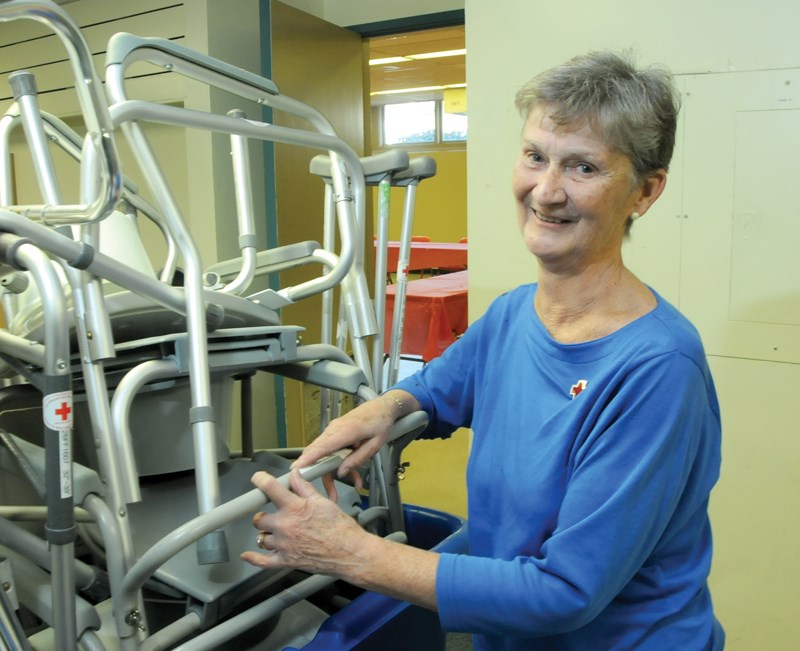For Cheryl Kent, volunteer at North Vancouver’s Red Cross Health Equipment Loan Program (HELP), one day is like another, meaning that every day is different.
A steady stream of people, young and old, male and female, from all corners of the world and all walks of life, come to borrow the health equipment they require – needs that vary with each individual.
Cheryl has volunteered with HELP, which operates in partnership with Capilano Community Services at the Delbrook Recreation Centre, for 3½ years.
It began at a social gathering when the conversation turned to volunteering. Miki Nash, administrator at Cap services, talked about the challenge of scheduling volunteers around their other interests. In this case, bridge.
“I’m not a bridge player,” Cheryl found herself saying.
When Cheryl retired from her job at Vancouver General Hospital, she anticipated her future would include time for more of her favourite things: walking and gardening, maintaining her reading and crossword habit, and enjoying life with family and friends.
She does all these and more. Still, there was a gap.
“During my working years, I was used to feeling useful and knowing I was contributing,” says the former chemistry technologist. “That’s how I felt at the lab, and that’s what was missing in my life after retirement.”
A second-generation North Shore resident, Cheryl remembers visiting her grandfather in the house where her mother and aunt grew up, on the flats where the North Shore transfer station now stands. Her mother reminisced about her younger days, renting a summer cottage in Garrow Bay with friends, driving “out west” along the dirt road that was Marine Drive in her Model T Ford.
In 1939, the year after the bridge opened, Cheryl’s parents moved to West Vancouver. Cheryl and her sisters played “Lions Gate Bridge” using leaves from the garden’s laurel hedge as tokens, with their driveway as the bridge and their bikes as vehicles.
At Christmas, the family rode the CPR Ferry from Vancouver harbour to Victoria to visit relatives, one visit in 1951 commemorated in a newspaper photograph. The girls attended Wee Folk Co-op Playschool, and went on to Pauline Johnson, Inglewood and West Vancouver secondary.
Cheryl was interested in science in school and trained at VGH in medical technology.
“These programs are now offered at BCIT, but in those days, the hospitals did the training,” she recalls.
Everything was done by hand – the testing, the meticulous record keeping – with test results transferred to the wards and to medical records when patients were discharged. All systems had been computerized when Cheryl, by then supervisor of non-routine chemical testing, retired in 2013.
These days, maintaining records on paper is so last century. Computers do this work for us, particularly so in the ever-expanding health-care field. Equipment records at HELP are maintained on a database by volunteers.
However, for Cheryl and her colleagues, paper records are more efficient for their purposes. At the HELP reception centre, even one computer would take up valuable space, and entering information for every transaction would simply take too long.
The procedures are routine but every transaction is different. Referrals are matched to the specific type of health-care equipment required. Each transaction requires its own paperwork, all organized in different boxes, ready to hand.
Watching Cheryl and her fellow volunteers complete the process in less than five minutes – matching paperwork, equipment and person for loans and returns, without a computer in sight – is like watching a performance: efficient, graceful and with no missteps.
Capilano Community Services reports that staff and a crew of 25 volunteers field up to 800 visits and 1,000 phone calls every month and this year handled 7,500 pieces of equipment for 3,400 people. And the demand is increasing.
Cheryl and her colleagues offer this advice to future users of health equipment, whether it’s a walker, wheelchair or a pair of crutches: Please bring a referral from a health professional and do call ahead. The equipment you need will be available, but it may not be on site the moment you need it due to increasing demand.
For information about HELP at the Delbrook Recreation Centre’s North Building at 600 West Queens Rd., call 604-988-7115 or visit capservices.ca.
Laura Anderson works with and for seniors on the North Shore.
778-279-2275, [email protected]



